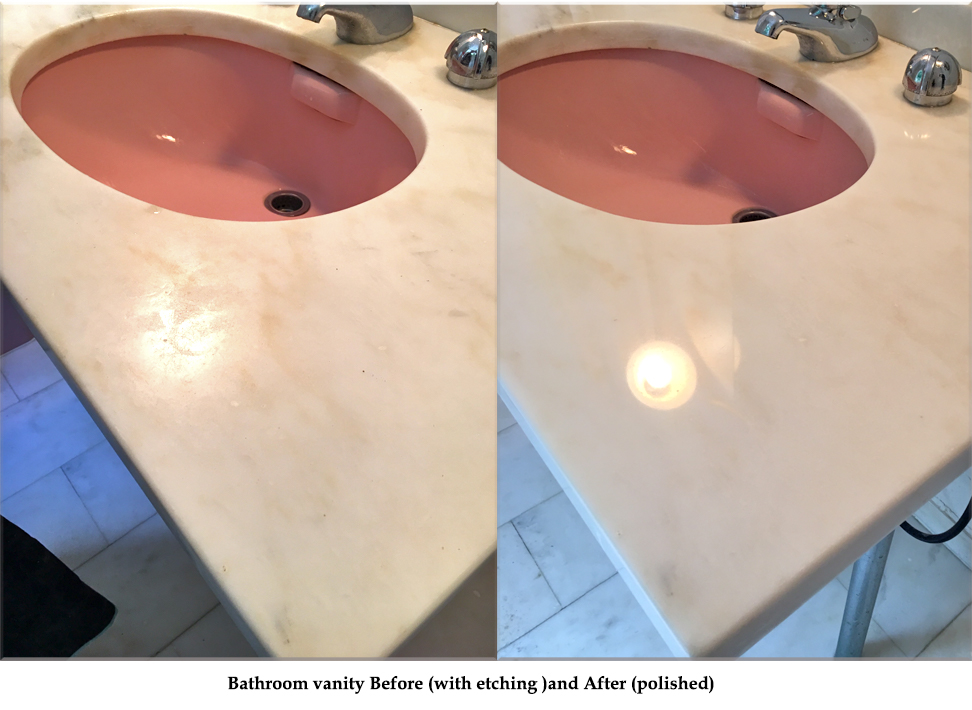There are certain products to avoid around marble, limestone, onyx, terrazzo, and other calcium-based materials. Acids are one of marble’s biggest enemies. When I say acids, that can mean many common products like orange juice, lemon, cola, milk, tomato, mustard, vinegar, and much of everything we consume. Of course, strong alkalines, such as highly ammoniated window cleaners or oven cleaners, can also be detrimental to certain materials too. And as expected, these blemishes usually must be honed and re-polished by a professional.
We know what is harmful to marble and other calcium based stones but even certain granites can be harmed by some chemicals. I have seen where a tomato was left on a black granite countertop for an extended period which resulted in a bleached effect. Black granite is not a true granite. It is more than likely a basalt, anorthosite, gabbro, or similar black igneous material. In any case, these stones can be subject to certain chemical attack, albeit not normally as sensitive as calcium-based materials like marble would be.
Strong alkalines (like floor finish strippers) can sometimes draw out the natural oils in certain stones like slate and other similar materials. This would leave them very dry and chalky looking. This can normally be rectified with the use of color enhancers or topical acrylic sealers.
Bug sprays can actually be acidic in solution. Re-polishing areas that were sprayed or over sprayed with pesticides may sometimes be necessary. Just be aware of this as I have seen this several times this year.
So let’s go over some of the “Don’ts” to start, so we can hopefully avoid many of these issues in the first place. First and foremost, never use products that are not specifically made for use on natural stone, including vinegar and abrasive cleaning powders. You would think that this would be a fairly easy rule to follow. Unfortunately, this is probably one of the biggest causes for acid etching and alkaline burns, on natural stone surfaces.
There is also a problem with many homeowner targeted topical coatings, which are being misapplied to natural stone surfaces. Mop & Glo, Rejuvenate, and other similarly labeled products should not normally be used on marble, granite and most all natural stone. Restoration contractors have to remove these bothersome coatings first, before they can restore the surface to its natural and intended beauty. This ends up costing you more, as additional steps are required.
I am usually not a fan of topical coatings, but there are certain applications where a sacrificial surface is necessary. Concrete and terrazzo guards are used sparingly to help protect these surfaces from acidic spills and heavy traffic wear. Make sure if you are going to apply a topical coating on any stone or masonry surface to follow the directions implicitly. Normally, multiple thin applications are better than overly thick ones. If you are applying an acrylic, urethane, or epoxy and you leave application marks, dust, bubbles, or any other imperfections in the coating, sometimes you are basically stuck. Many of these products can only be efficiently removed by grinding. If you have a slate or textured stone, grinding is not applicable so chemical removal is the only option.
Now let’s discuss some “dos”. Maybe we can alleviate some potential issues by prescribing proper maintenance procedures.
When the need arises for certain products that may be in question, say like a toilet bowl cleaner (which is normally an acidic product), use one like the Majestic Toilet Bowl Cleaner which is non-acidic.
Use either Majestic No-Rinse Neutral Cleaner or Majestic Stone Plus (has a great scent) for routine cleaning of all natural stone surfaces. Both of these products are pH neutral and great for all surfaces that are safe for water (even on mirrors). Every homeowner should have either the Majestic No-Rinse Neutral Cleaner or the Stone Plus for their natural stone.
Majestic Stone Soap is recommended for honed and textured surfaces. Stone Soap cleans and conditions while keeping colors bright and rendering the stone more stain resistant from spills.

Use of correct maintenance products is a must but also the use of cutting boards and coasters is essential. This will help with preventing scratching, etching, and water spots (mineral deposits). Of course it goes without say that all spills should be wiped up as soon as possible. If an occasional light etch occurs, Majestic Etch Remover can be used effectively to re-polish the area in most cases.
Grease and oil can be a problem with most any natural stone surface in a kitchen environment. Use of Majestic Low Odor Solvent Based Impregnating Sealer periodically will definitely help to prevent staining from these contaminants. If the counter top is no longer beading water sufficiently, it is safe to wipe it down with the Low Odor Impregnator again. Just remember, it is easier to prevent staining than to remove it.
If a color or gloss enhancing product is required, contact Stonecare Central for expert technical advice.
As always, I recommend submitting a test area to confirm the results and the procedure prior to starting general application. Also a great way to help ensure success with difficult projects is to partnering with a good stone restoration professional that is knowledgeable and experienced. They can help with diagnosis, product purchase decisions, logistics, and other pertinent project information. Oh, and use your smartphone to take pics to aid in dealing with technical questions.